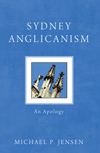Sydney Anglicanism: An Apology Michael Jensen
Are you enjoying your summer reading? This book needs to be there with you. Amid the turbulence in Anglican circles locally and abroad, Dr Michael Jensen’s Sydney Anglicanism: An Apology injects much-needed calm and a constructive word into our ecclesiastical climate.
 Holding a unique vantage point as lecturer in doctrine and church history at Moore College and as son of the outgoing Archbishop of Sydney, Jensen’s purpose is to explode a particular narrative about Sydney Anglicans.
Holding a unique vantage point as lecturer in doctrine and church history at Moore College and as son of the outgoing Archbishop of Sydney, Jensen’s purpose is to explode a particular narrative about Sydney Anglicans.
The narrative is told two different ways. One side speaks as if Sydney is some kind of extremist monstrosity unleashed within the Anglican Communion. The other side speaks as if Sydney alone is the idealised New Jerusalem, holding the torch against the onslaught of darkness. Jensen’s major thesis is that both extremes are untrue and holding to either is potentially disastrous. He thus puts forward an apology setting forth a true telling of the narrative of Sydney Anglicans, albeit a true telling with constructive comments and ‘elements of honest critique’.
The book is divided into two sections that tell our story through the lens of two significant theological contributions Sydney has made relating to the doctrine of the Bible and the Church. In section one fundamentalism is discussed and the accusations made by Muriel Porter and her detractors are clinically dissected. The genesis of the robust way of reading the Scriptures by the likes of Donald Robinson, Bill Dumbrell and Graeme Goldsworthy, known as ‘biblical theology’, is outlined and Jensen asks ‘Where to now?’. Propositional revelation, Broughton Knox and Peter Carnley’s critique are examined by discussing Sydney’s belief that divine revelation can truly be apprehended in words. The story of Sydney’s ‘romance with preaching’ is told, illustrated by John Stott, expository preaching and phenomena such as the Katoomba Christian conventions.
What Jensen describes as the ‘controversies of the present era’ are picked up in section two on the Church. An accurate description and fair evaluation of Knox-Robinson ecclesiology is given with some constructive and biblical modifications. The chapter ‘Are Sydney Anglicans Actually Anglicans?’ does a concise and careful job of determining what it means to be Anglican and evangelical.
Whether Sydney Anglicans have failed in their response to the world is asked, as Jensen discusses SRE in schools, social justice, racism and Connect09. Sydney’s position concerning women and ministry is given judicious and firm coverage, as Sydney is defended from the charge of Arianism. The cause of lay administration of the Lord’s Supper comes in for discussion, finishing with a constructive discussion about the Anglican Church League and church politics. The conclusion rightly anchors the whole discussion in Christ’s death and resurrection and the providential power of the Lord in whom we can entrust all things.
Besides appreciating the non-anxious tone of this book, what struck me most was Jensen’s ability to combine historical background with solid theology and present a precise and provocative case that gets to the nub of the issue and provides great food for thought.
Sydney Anglicanism: An Apology is a must-read for anyone who identifies with the tag of “Sydney Anglican” or is interested in any of the above issues. It is a highly accessible book for an educated layperson through to trained clergy. Its success is that it refreshingly refuses both a siege mentality defensiveness and a purely critical spirit. Some readers might disagree about some elements but all should benefit from Jensen’s careful engagement with the important issues at stake. SC
Mark Earngey is assistant minister in the parish of Toongabbie.
Photo credit: weirdisnothing

























